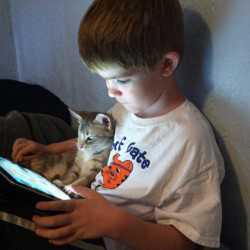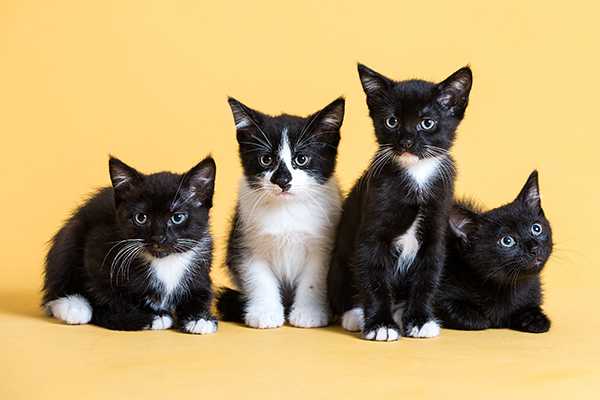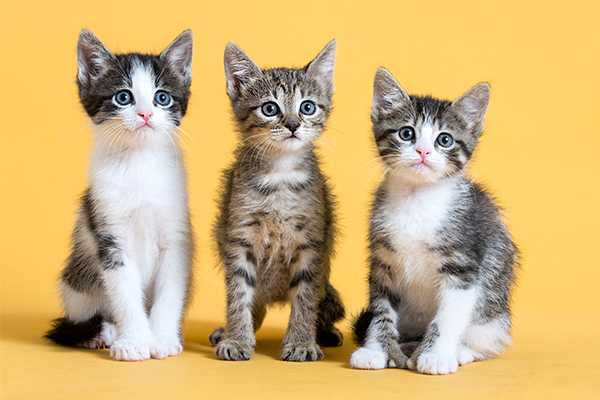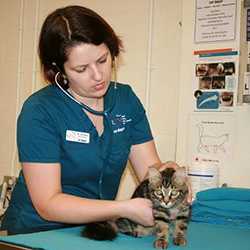Loving Your Special Cat

Conner and his best friend, Jelly, a special kitty his family adopted.
(Photo courtesy of Cat Depot)
“Jelly is my best friend,” 6-year-old Conner told his mom, referring to the family’s dilute-calico cat. Jelly and Conner make a special team: a one-eyed cat and a boy with autism. From the beginning, the two have enjoyed each other’s affection and a bond that transcends such limits.
“I think they’ve embraced each other’s quirks,” says Conner’s mom, Katie. “Because of Conner’s autism, he’s not fond of touch. But he warmed up to this special kitty right after we adopted her. Conner sat down to play with his iPad and after a few minutes, Jelly overcame her shyness and cozied up to him. An hour later, they were still sitting on the bed together. Even though Conner is not super touchy, he likes to pet Jelly!”
Conner invites Jelly’s attention by clicking his tongue and calling her name; she prances over. Likewise, when Jelly wants Conner to interact with her instead of playing with his blocks, she “dive-bombs” his toys in the living room. Conner starts giggling.
Conner’s adopted cat is not only a loving, funny companion who watches adventure movies with him, but she is also a teacher to this first-grader. Conner has learned responsibility by feeding Jelly (not human food) and filling her water bowl.
Two-year-old Jelly came from Cat Depot, a no-kill shelter in Sarasota, FL, that helps homeless, abandoned, and injured animals. Its mission is to save lives, find loving homes, and provide resources and education to make the world a better place for cats. Since the nonprofit organization opened in 2004, it has succeeded, with more than 8,000 adoptions.
Cat Depot houses approximately 125 cats and kittens on any given day. Often, they were relinquished by a senior citizen who moved to assisted living or a condominium that didn’t allow pets. “It’s heartbreaking for the cats as well as the owners,” says Lynn Rasys, director of communications. Cat Depot is located in a county where one-third of the population is 65 years of age and older. “We provide an environment to keep our cats and kittens as physically healthy and mentally happy as possible while they await a new home.”
The 11,000-square-foot facility comprises free-roaming indoor and outdoor cat suites with cubbies, climbers, and kitty doors to outdoor “catios,” plus rotating fans to move the air.
Helping Fat Cats Lose Weight


Cat Depot Kittens
(Photos courtesy of Connie Summers)
One of the cat pods is for overweight kitties that eat a special diet and have weekly weigh-ins. “These are cats that could eventually suffer from chronic or serious ailments due to their weight,” says Dr. Jill Kirk, veterinarian for Cat Depot. “Like humans, cats can develop diabetes, liver problems, joint pain, and other health issues from being overweight. We are working with them to trim down to a more desirable and healthy weight.”
She points out that whatever their size, cats provide great companionship. “When you’re petting a cat or have one sitting in your lap, it is calming. It lowers your blood pressure and reduces anxiety and stress. Being around cats decreases the stress hormone cortisol and increases serotonin, a ‘feel-good’ hormone. Having a pet gives some people a reason to wake up in the morning. Of course, families adopt from us, too. Cats can be easier to take care of than dogs; they can be left alone for the day and don’t need to be walked. But of course, they still need playtime and exercise to stay in shape!”
People of all ages have found their perfect match at Cat Depot, which shelters mixed and pure-breeds, such as Abyssinian, Bengal, Himalayan, Maine Coon, Persian, and Siamese. “We encourage people to call us first and save a life, rather than go to a breeder,” says Kirk.
Spaying and Neutering Curbs Overpopulation

Cat Depot veterinarian, Dr. Jill Kirk
(Photo courtesy of Cat Depot)
More than 25% of the 96 million owned cats in the United States were adopted from an animal shelter, according to the Humane Society of the United States. While it is impossible to determine how many strays live in the United States, Kirk says, the cat population is definitely out of control. “We’re trying to increase live release rates and decrease the number of healthy, adoptable animals that are euthanized due to a lack of homes.” (Live release rates are the percentage of animals leaving shelters alive through adoption, return to owner, or transfer to another agency.)
Only a small percentage of cats have been spayed or neutered by the time they arrive at an animal shelter. Meanwhile, a fertile cat in Florida produces an average of one to three litters a year, with an average of four to six kittens per litter. Spaying and neutering helps reduce cat overpopulation in the United States. Many facilities like Cat Depot provide free or low-cost sterilization, in addition to affordable veterinary care.
Kirk also encourages cat owners to protect their pets’ health by:
- Keeping animals indoors. Statistics show they will live longer, with outdoor cats averaging a life span of one to four years due to injury and infectious diseases. When adopters sign a contract with Cat Depot, they agree to keep their new pet inside.
- Taking cats for an annual veterinary exam and providing the proper vaccines when needed.
- Applying a monthly flea and tick preventative treatment.
As a no-kill shelter, Cat Depot offers this healthcare to all of its feline residents until they find the purr-fect new best friend—like Jelly did with Connor.
- Page last reviewed: February 8, 2017
- Page last updated: February 8, 2017
- Content source:


 ShareCompartir
ShareCompartir